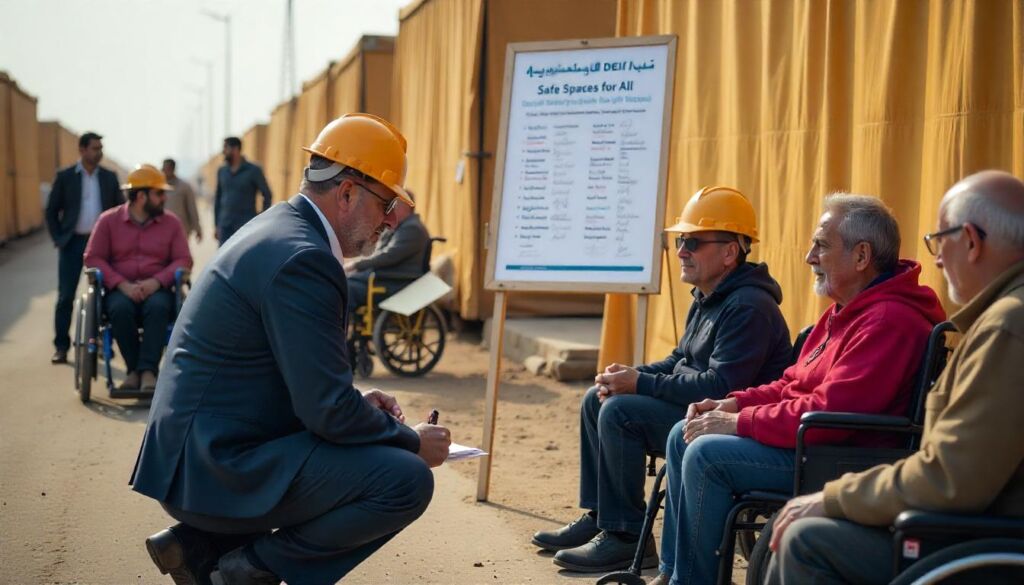Executive Summary
Leadership Commitment to DEI (Diversity, Equity, and Inclusion) is a cornerstone of modern workforce strategies, particularly in regions like the UAE, Saudi Arabia, Kuwait, and Europe. As businesses expand globally, fostering an inclusive workplace is no longer optional—it’s a competitive necessity. Leaders who prioritize DEI benefit from enhanced innovation, employee engagement, and compliance with evolving legal frameworks. In multicultural hubs such as Dubai and Riyadh, DEI initiatives help bridge cultural gaps and attract top-tier talent. This article explores the significance of Leadership Commitment to DEI, best practices, common challenges, and actionable solutions to build a truly inclusive organization.
Chapter 1: Introduction to Leadership Commitment to DEI
Leadership Commitment to DEI is the deliberate effort by organizational leaders to foster diversity, equity, and inclusion at all levels of the workforce. This commitment goes beyond policy—it requires active engagement, accountability, and cultural transformation. In regions like the UAE and Europe, DEI is influenced by legal mandates, cultural norms, and HR best practices. For example, the UAE’s Labour Law emphasizes equal opportunities, while the EU’s anti-discrimination directives set stringent standards for workplace fairness.
Leadership Commitment to DEI is critical in mitigating biases during hiring, promoting underrepresented groups, and ensuring compliance with local regulations. Companies like Unilever and Emirates Group have set benchmarks by embedding DEI into their core values, resulting in higher employee satisfaction and global recognition. Without strong Leadership Commitment to DEI, organizations risk reputational damage, legal penalties, and talent attrition. Leaders must champion DEI through transparent policies, training programs, and measurable outcomes to create a sustainable impact.
Chapter 2: Best Practices for Leadership Commitment to DEI
Detailed Strategies and Methodologies
Effective Leadership Commitment to DEI involves structured strategies. First, conduct bias training for hiring managers to eliminate unconscious prejudices. For example, Google’s “re:Work” initiative provides tools for inclusive hiring. Second, establish Employee Resource Groups (ERGs) to amplify diverse voices, as seen at Microsoft. Third, implement mentorship programs to support career growth for underrepresented employees, a tactic successfully used by Accenture. Finally, leverage data analytics to track DEI progress, ensuring accountability at all levels.
How Allianze HR Consultancy Helps
- Free Hiring Model: Allianze HR Consultancy eliminates financial barriers for job seekers, ensuring access to opportunities without fees. This model attracts a broader talent pool while maintaining ethical standards.
- Ethical Sourcing: Allianze sources talent from South Asia with full compliance to labor laws, including transparent contracts and fair wages. Rigorous vetting ensures candidates meet both skill and cultural fit requirements.

Allianze’s services extend beyond recruitment, offering DEI consulting to align hiring practices with global standards. Their expertise in regional labor laws—such as Kuwait’s private sector quotas—helps clients navigate complex compliance landscapes. By partnering with Allianze, organizations gain a strategic ally in building diverse, high-performing teams.
Chapter 3: Common Challenges and Solutions
Leadership Commitment to DEI faces several hurdles:
- Resistance to Change: Employees may resist DEI initiatives due to misconceptions. Solution: Conduct workshops to demonstrate DEI’s business benefits, as done by SAP in the UAE.
- Legal Complexity: Varying laws across regions (e.g., Saudi Arabia’s Nitaqat program) complicate compliance. Solution: Partner with local HR experts to interpret regulations.
- Cultural Barriers: Stereotypes can hinder inclusion. Solution: Foster cross-cultural training, like IKEA’s “Diversity Days.”
- Lack of Metrics: Without data, progress is unmeasurable. Solution: Use tools like LinkedIn’s Diversity Insights to track representation.
- Tokenism: Superficial DEI efforts backfire. Solution: Integrate DEI into performance reviews, as practiced by Salesforce.
Checklist: Best Practices
- Use job descriptions that respect local laws. For example, UAE’s anti-discrimination laws prohibit gender-based job ads. Tailor language to avoid bias.
- Offer relocation support. Provide housing assistance, visa sponsorship, and cultural orientation to ease transitions, as seen with Amazon’s global mobility program.
- Partner with ethical agencies like Allianze. Ethical recruiters ensure fair wages and transparent processes, reducing exploitation risks.
- Use regional keywords in job ads. Terms like “Dubai-based” or “Kuwaiti national preferred” improve visibility in local searches.
Conclusion
In conclusion, Leadership Commitment to DEI is indispensable for modern organizations. To summarize, successful DEI strategies require training, data-driven metrics, and cross-cultural collaboration. Ultimately, companies that prioritize DEI outperform peers in innovation and retention. Five final tips: 1) Secure executive buy-in, 2) Audit hiring practices annually, 3) Invest in ERGs, 4) Leverage technology for bias-free recruitment, and 5) Partner with ethical consultants like Allianze.
About Allianze HR Consultancy
Allianze HR Consultancy is a leader in ethical recruitment, serving clients across the UAE, India, Nepal, Kuwait, and Saudi Arabia. Founded on principles of fairness, Allianze offers end-to-end hiring solutions, from talent sourcing to compliance management. Their zero-cost model for job seekers ensures equitable access to opportunities, while rigorous vetting guarantees quality hires. Success stories include placing 500+ professionals in GCC roles with 98% retention rates. Contact us today to streamline your recruitment needs.


